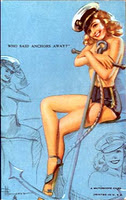
I do. I do. I do believe in miracles. And this year, I got one for Christmas at a time when our family needed it most.
Last week, my son painted the picture you see posted above. As far as I know, he had never picked up a paintbrush before, much less exercised such skill with paints.
For any child, I'd find the painting remarkable, but this child, this budding artist too soon to become a young man, also happens to have autism. Until recently, his education has been erected on a long line of "can't" and "will never." That's the way it is in Florida--which is why we're dropping everything and leaving,even if that move breaks us financially.
If you're a doctor, teacher, therapist, or any other person interacting with persons with autism, and you believe that those on the spectrum--even the severely affected--are without hope, value, and depth of emotion, then I beg you to think again. As you approach these amazing human beings in your work, please strive to keep your "cants" and "will nevers" to yourself. Dare to presume intelligence, even in the apparent absence of it.
I have two sons with autism, and a daughter teetering on the edge. Because of them, I believe in miracles. I want you to know that my children aren't a curse. Their autism is not a scourge to be erased from the face of the planet. They aren't a hardship, although some days I moan and whine because their struggles overwhelm me, and I am terrified what will become of their lives when I am gone.
Those daily struggles are seldom about them as human beings, or their autism. They are instead centered on the battles involved in jousting with....well, educators, politicians, and health care professionals who just can't...or perhaps won't...see beyond the DSM lV to discover the capabilities of the person behind the label.
As the years have ticked by, I have come to see that these children, as strange, complex and maddening as they are, are perfect just as they came to me. They have filled my life, my heart and my dreams for the future in ways I never dreamed possible. Because of them, this world is a better place.
If you have looked at the picture my son painted, and you still don't understand why we must presume intelligence, even in the apparent absence of it, and you still can't see how important it is to leave a space open for miracles in approaching this population, then I beg you to consider another career.
This Christmas I am taking time to thank God for my children, and the little chain of miracles that brought them into my life. I hope you will join me.
May miracles breath life into your Christmas season as they have mine. May you also come to believe in miracles. Because, you see, miracles don't discriminate. They believe in all of God's children. Even the ones with autism.
Merry Christmas.



